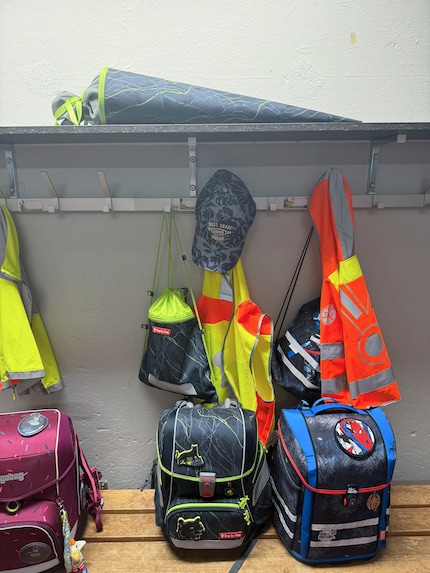
Background information
When your child loses the game – and their temper along with it
by Martin Rupf

All of a sudden, your child’s starting school – and as parents, you’re faced with a whole new set of questions. Here, the city of Zurich’s chief school psychologist provides the answers.
Just yesterday, I was carrying him around like a little joey. Then there he was, beaming in front of the big school building. He turned to me, pressed his school cone into my hand, and whispered with a meaningful look: «Mummy, take this!» The other children didn’t have one. With that, my child’s school career had just begun – and I’d already made my first mistake.

I quickly realised that the school cone wouldn’t be the only thing I’d have to deal with as the mother of a newly school-age child. But the question that began to interest me most was: how do I know if my child’s really doing well at school – and what can I do to keep it that way?
Because many parents of school-age children feel the same way, I spoke with Matthias Obrist, head of the School Psychological Service of the City of Zurich and president of the Swiss Association for Child and Adolescent Psychology at his office in the Zurich School Office. Among other things, he explained when parents should help with homework and when it’s better to keep quiet – and what else prepares children for successful school careers.
In the canton of Zurich alone, around 15,000 children started school in August. I imagine school psychological services are extremely busy right now, just after the start of the new school year…
Matthias Obrist: The vast majority of children are managing the transition from kindergarten to school well, proudly wearing their new fluorescent safety vests and school bags. However, we do have some requests – albeit not a huge number – because children are overwhelmed and unsettled.
What are the biggest challenges for children during the transition from kindergarten to school?
There’s an increase in social comparison. Sometimes a child doesn’t want to go to school because they feel they’re not as good as the others. Sometimes there’s also anxiety because the new route to school and the large school building with 200 to 300 older children on the playground are unfamiliar.
I heard somewhere that children often start out motivated and then slip back before the autumn break. What’s your take on this?
It’s normal for the initial euphoria to subside after a few weeks. The step from playing to learning is big and challenging. Children need stamina and a certain amount of tolerance for frustration until they understand the abstract rules of reading and maths. Also, the days are longer than in kindergarten, where there are more opportunities for rest and unstructured activity. At school, there’s a structured schedule, and homework to be done afterwards.
Homework’s a good example of something that parents have never considered before their first child starts school. It raises entirely new questions: should I help my child with their homework or let them do it themselves?
Yes, starting school is a change for parents too. Teachers explain homework at school in a way that allows children to do it independently. This also builds their self-confidence.
What if they get stuck?
Then you can offer help. You generally stay in the background during homework, but you’re there when they need you. As little as possible, but as much as necessary. If a child repeatedly struggles with homework, parents should contact their teacher. They have good teaching materials that can provide support. I think it’s important to give the child confidence, saying: «You’ll learn this. We have time, and you’ll go at your own pace.» Grass doesn’t grow any faster if you tug at it.
Communication between teachers and parents isn’t always smooth sailing. What can you do if you’re having issues?
Persevere. Some teachers may not want to adapt their lesson plans for a single child. But that’s short-sighted. In every class, there are children who don’t fit the norm and need more or less challenging tasks than the rest of the class. If a teacher tailors content to the individual child’s level of knowledge, they actually end up having less to do because the children are motivated and don’t cause any disruption. Pockets of satisfaction and success are important for learning motivation. Of course, this can also happen outside of school – through a hobby, for example.
How do parents recognise their child needs help?
The behaviour of children who have just started school can indicate they’re unhappy. Or if a child isn’t sleeping well, seems depressed or comes home from school feeling irritated and throws their bag in the corner.
How should you react?
Stay calm, listen carefully and observe. Sometimes children will tell you or draw something that’s bothering them. I think it’s important to take their mood seriously and seek out a conversation with the school sooner rather than later. Sometimes children only show their discontent at home because they’re trying to adapt at school. This is important for teachers to know. Even if you don’t understand a child’s behaviour at first, you should be aware that there’s a good reason for every behaviour, which often only becomes clear over time.
Do you find that parents are hesitant to contact school psychological services – perhaps out of concern that something about their child might not be «normal»?
No two parents are the same. Some have reservations about receiving advice from a stranger. Others are happy there’s someone beyond the teacher who can help. And others feel that miracles can be performed for any child if only a diagnosis is made and the right measures are implemented. Overall, however, attitudes towards school psychology are better than they used to be. At the same time, because we’re not a private practice, we can’t expand our capacity. This unfortunately means that minor difficulties have a longer wait.
How do you classify these cases? Which are considered minor and which are considered acute?
If a child repeatedly refuses to go to school for an extended period of time or massively disrupts classes, swift action’s needed. Special education and conflict between schools and parents are also considered urgent. A child who’s not doing well but still attends school has to be considered a less urgent case.

You’ve been working as a school psychologist for 30 years. What’s changed in terms of mental health in schools during this time?
Among adolescents, mental health has shifted towards anxiety and depression, especially among girls. We should keep an eye on this trend. But I also want to stress that 90 per cent of adolescents are doing well. We have fewer figures for children. I think it’s great that awareness of mental health has increased – and that we’re talking about it more.
How can parents set their child up well for school right from the start?
Parents should show interest in their child and reassure them when problems arise: «You can do it, and I’m here for you.» Overall, I think parents should have more confidence in their children. Getting outside in the dirt and coming into contact with germs strengthens their immune system. Just as tackling – and overcoming – even minor adversities strengthens a child’s psychological resilience.
If you could change one thing in our schools, what would it be?
I’d like to see social-emotional learning given the same importance in schools as reading, writing and maths. Children should learn even more about self-awareness, dealing with emotions and getting along well with others. Some progress is already being made, but there’s still more to be done.

I'm really a journalist, but in recent years I've also been working more and more as a pound cake baker, family dog trainer and expert on diggers. My heart melts when I see my children laugh with tears of joy as they fall asleep blissfully next to each other in the evening. They give me inspiration to write every day - they've also shown me the difference between a wheel loader, an asphalt paver and a bulldozer.
Interesting facts about products, behind-the-scenes looks at manufacturers and deep-dives on interesting people.
Show all